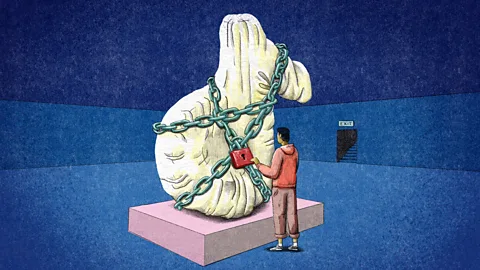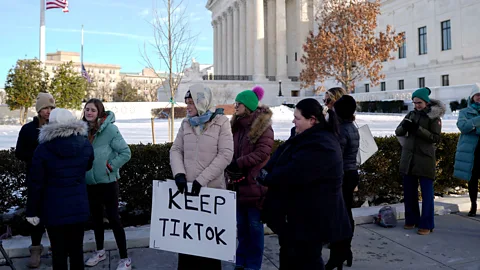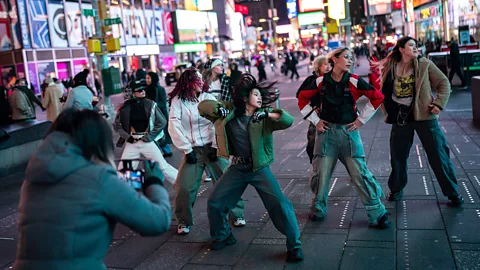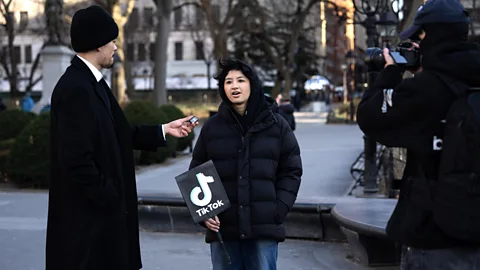What dies with TikTok? As a ban looms, Americans face a cultural void
 Emmanuel Lafont
Emmanuel LafontWith an American TikTok ban threatening the app, users and creators reflect on what it did for internet culture – and what their online worlds might look like without it.
It's possible TikTok made more people famous than any other company in history. It also sparked controversy in nearly every market it entered. India banned TikTok in 2020, and the app has been facing the same treatment in the US.
A law that will effectively ban TikTok in the US is set to go into effect on Sunday 19 January, after a failed bid to save it in the Supreme Court. But in TikTok's final days, the Biden administration reportedly said it will defer enforcement of the law to President-elect Donald Trump, who's also signalled a willingness to save the app – even though both men previously fought for the ban.
The involvement of both an outgoing and incoming US President is an extraordinary signal of just how much is at stake. The law that bans the social media platform in the US unless its Chinese parent company ByteDance divests from the app was passed by Congress on the grounds of national security. Lawmakers voiced concerns that data from the app could be collected by the Chinese Communist Party, or that the platform might be used to spread propaganda. TikTok denies that it would ever allow the Chinese government to collect user data or influence content on the app. The company tried and failed to defeat the law in court over First Amendment claims.
It leaves TikTok's fate uncertain in an era when online culture has been defined by the app's success.
 Getty Images
Getty ImagesWith the guillotine hovering over TikTok's neck, users are bracing for a cultural void. For all the criticisms levied at the app, many say TikTok created a system that made them feel nurtured and uniquely empowered. Some users worry they could lose their home on the internet, one they fear other apps like Instagram and YouTube can't or won't replace.
No platform in recent memory has had a story or impact quite like TikTok's. The app was at the centre of ferocious political debates. It ruined many nights of sleep with its seductive and sometimes vapid doom scroll. TikTok increasingly sucked news, entertainment and social life into the vortex of its powerful but fickle algorithm. But it also fuelled thousands of small businesses – TikTok says more than seven million businesses use TikTok and that it helped to drive $15bn (£12bn) in revenue for these US businesses in 2023.
TikTok filled billions of idle hours with entertaining, informative content. It offered opportunities to activists and artists at a moment of increasing uncertainty. In just a few years, TikTok rewrote the playbook for social media companies and changed countless lives.
A third of US adults and the majority of teenagers are on TikTok, and globally, the app has been downloaded nearly five billion times. According to an analysis by Know Your Meme, more of the internet memes gathered by its encyclopaedia came from TikTok, starting in 2022, than anywhere else. Without a doubt, TikTok is the hub for online culture.
"I really don't like the app if I'm being honest," says Adam Aleksic, a creator based in New York with over half a million followers on TikTok. "But I also love it at the same time. It's giving me my living. I would probably be in law school right now if it wasn't for TikTok".
It remains to be seen whether or how the US TikTok ban will be implemented. Officials from the Biden administration – which championed the ban and battled to defend it in the courts just this week – reportedly said American's shouldn't expect the app to go dark this weekend. The incoming Trump administration has also said it's looking for ways to save the app. But the possibility of TikTok's demise in the US has led users and creators to contemplate moving to other platforms, whether established ones in the American market like YouTube Shorts and Instagram Reels, or newcomers like Red Note, another Chinese social media platform. But many say it's unlikely other outlets can recreate what TikTok was.
'Collective effervescence'
The TikTok users know today originated in 2018, but it didn't rise to dominance until quarantines during the Covid-19 pandemic moved life online in the spring of 2020. The first generation of TikTok stars earned fame by posting from the bedrooms where they spent lock down. At the same moment, in April 2020, ByteDance released CapCut, an app that offered a free and easy-to-use smartphone interface for editing videos, splicing audio, and creating special effects. CapCut democratised video editing, allowing more users to experiment with new ideas and post their work on TikTok. ByteDance reaped the rewards of the content users made and the eyeballs they attracted.
"It was a moment of collective effervescence," says Robert B, an American creator with over a quarter million followers who started making TikTok videos during the 2020 lockdown. Robert, who asked to withhold his full name to protect his online identity, posts educational content about medieval music. He was initially drawn to TikTok because it offered the chance to make music with others when he couldn't be in-person with them.
Having already experimented with other tools for splicing voices and instruments together, he found that TikTok "was just so quick and easy" by comparison. Features like stitches and duets, where users can reply and riff on each other's videos, allowed music and dance to come to life during the pandemic. "I was able to feel a connection with those people," Robert says. "Even though they didn't know me and sometimes they saw it, sometimes they didn't."
 Getty Images
Getty ImagesFor Aleksic, a linguist who creates content studying the development of language online, features like stitches, duets and hyperlinks in comments help to make the app a hotbed of linguistic innovation. "TikTok is designed for people to respond to each other. It's really distinguished by its collaborative atmosphere," he says. "TikTok is where things are happening."
Part of TikTok's collaborative atmosphere might also come from its outsider status. By and large, younger Americans users grew up with Google and Meta products due to those companies' long tenure and market dominance in the US. TikTok emerged in the US market as something new and innovative. TikTok's short-form video, a term most had never heard until the app's explosion in 2020, was so successful that it's come to define the modern internet, forcing everything from Instagram to LinkedIn to copy the feature.
Even if you aren't a part of TikTok, you're immersed in its culture. The app's content is so often reposted and reinterpreted on other platforms that it's become the gravitational centre of the web. A common refrain among users is that watching Instagram Reels is like "scrolling TikTok on a two-week delay". Reposts of older TikToks also fuel discourse and political commentary on X, most famously through the conservative account LibsofTikTok.
All about the algo
The most feared and famous part of TikTok is its algorithm. TikTok distinguished itself not just through editing tools and unique features, but through its ability to "silver-platter-style deliver the content from creators we are most compelled to interact with", as user Alexx Johnson of Texas puts it.
Certainly, researchers at Baylor University in Waco, Texas, found that TikTok users experience greater levels of "flow" – where someone is totally absorbed in a task – and time distortion than those using Instagram. But Instagram was found to be more personal in nature, with people sharing posts with a more intimate circle than on TikTok.
The TikTok algorithm tends to prioritise the discovery of new content, exposing users to new videos to a degree that other platforms simply aren't, at least for now. Where YouTube and Instagram often seem to focus on serving videos by already-famous creators to already-subscribed fans, TikTok focuses on promoting new content, often from upstart creators and casual users. Meta and Google, which owns YouTube, did not respond to requests for comment.
"TikTok's algorithm seems to be a lot more generous", says Kay Perron, a content creator based in the Michigan, US who makes left-leaning news and political commentary.
For creators and users who post and view on other platforms, the difference is clear. Many have noted that TikTok spawned and fewer extremely-famous ones than platforms like YouTube or Instagram. "I don't think any other platform gives your normal, average American the ability to get so many people viewing and engaging with your content," says Perron. "It's crazy how you can post something and 30 seconds later, you've got somebody from the UK or Ireland that has just viewed it and is commenting."
For many creators and users, it's that "generosity" of TikTok's algorithm which keeps them engaged. "TikTok's algorithmic infrastructure levelled the playing field, it's not the same sanitised Instagram Explore grid or most prominent YouTube creators", says Jess Rauchberg, a professor at the University of Seton Hill in New Jersey, US who studies the creator economy.
But while TikTok may help creators gain exposure and users engage with the causes they care about, many see evidence of censorship on the platform. Users get no direct insight into TikTok's algorithm. Still, so many have noted the app's apparent tendency to suppress certain words and topics that an entirely new way of speaking emerged on TikTok. A prime example of this "algospeak" is using the word "unalive", due to a belief that the algorithm will bury videos that use the word "die". Aleksic, whose upcoming book Algospeak: How Social Media Is Transforming the Future of Language deals with this phenomenon, says algospeak is a way of skirting or anticipating censorship, which the majority of TikTok users seem to understand as par for the course. Algospeak can also be a way of signalling solidarity.
"For many disabled creators, the community they've built on TikTok is worth navigating platform bias," says Jess Rauchberg, who specialises in the use of social media by disabled and marginalised creators. Like many social media platforms, TikTok has struggled with the spread of hate speech and misinformation, though some observers say recent policy changes at other companies could worsen the problem elsewhere online. Meta, for example, recently announced changes to its own content moderation rules that campaigners say could encourage hate speech.
 Getty Images
Getty ImagesResearchers often use the term "black boxes" to describe social media algorithms. Not only are algorithms like TikTok's closely-guarded corporate secrets, they're also impenetrably complicated, coordinating hundreds of billions of interactions per day. They work at such a massive scale that even the people running the algorithms often can't even begin to explain how they make any individual decision.
Due to the app's massive scale, it often feels like every niche and demographic is represented among the 170 million Americans who, according to TikTok, use it for an average of 51 minutes a day. Perron, 59, says one of her favourite parts of the app is the ability to connect with younger generations and learn about what they're watching, feeling and thinking about. "Another social media algorithm might keep somebody consuming content within their age group. TikTok brings us all together and generates more of an appreciation for each other", says Perron.
Robert, 39, agrees. "TikTok is the only thing that feels explicitly catered to a younger demographic that I still understand."
Controlling the narrative
In an age where traditional media institutions are increasingly unable to attract audiences and make money, TikTok's algorithm – with its tailor-made recommendations and addictive quality – has often outcompeted other narrators of public life. It has been able to provide content that is cheaper to make, more entertaining, and less constrained by traditional norms and gatekeeping practices. Getting news from social media, for the one-in-five Americans who do so, means hearing about the world from friendly people whose political views often align with their own, rather than institutions such as newspapers that speak in a way that is more official and less intimate. Some even believe this discrepancy is an unspoken motivation behind the ban. "It's harder to control the American media narrative if TikTok exists," Aleksic says.
The consequences of the shift of power to mass audiences, algorithms and short-form video platforms are discomforting even to many of the people who spend their days on them and devote their careers to doing work through social media.
From one perspective, TikTok is a major gig economy employer in the US and in other countries, just like Uber or Doordash. Viewed from another perspective, TikTok is a crucial piece of social infrastructure, empowering regular people to distribute news, media and information to the public.
To many in the national security space, that makes TikTok too important to allow its foreign ownership. Debates about TikTok's connection to China – which were spearheaded by President-elect Trump, who's since switched positions on the subject – originally centred around data, the idea that China could use the app to siphon information about Americans. Since then, privacy experts have noted that American apps including Facebook, Instagram, X and YouTube have exposed their user data to identical risks through partnerships with Chinese advertising companies. Many also point out that if the Chinese government wanted American user data, it could buy that information from one of the thousands of data brokers that sell it in an almost entirely unregulated market. In the years since TikTok became a target for American politicians, conversations have largely shifted towards the idea the China might use the app to sew discord and spread propaganda.
But while the ban bill cites national security concerns and places TikTok in a broader geopolitical context, the platform exists in an intimate context for many Americans. It is a place to enjoy art, seek advice, hear the news, talk to friends and explore the world. Many users and creators have found not just an audience and income on TikTok, but something more important. "It's not about content. It's about the ideas," says Aleksic. "I'm using content as a means for the end of communicating something important."
If TikTok does go dark in the US, its users will still have something to say. The question is where they will say it.
--
For more technology news and insights, sign up to our Tech Decoded newsletter, while The Essential List delivers a handpicked selection of features and insights to your inbox twice a week.
